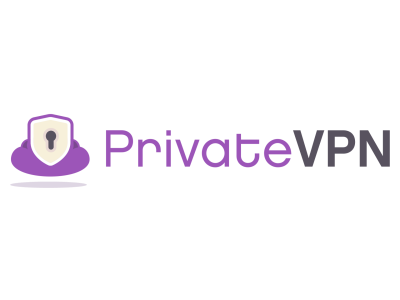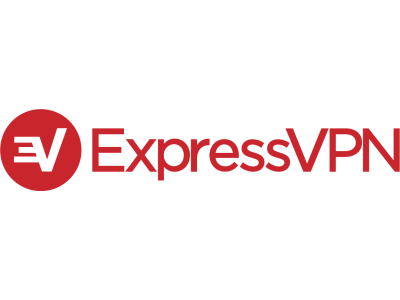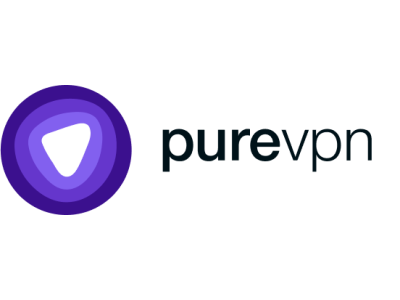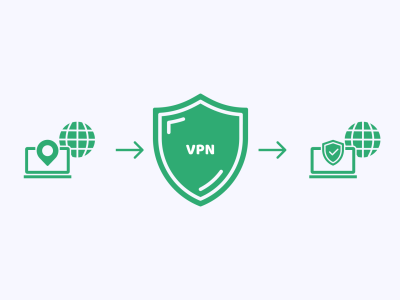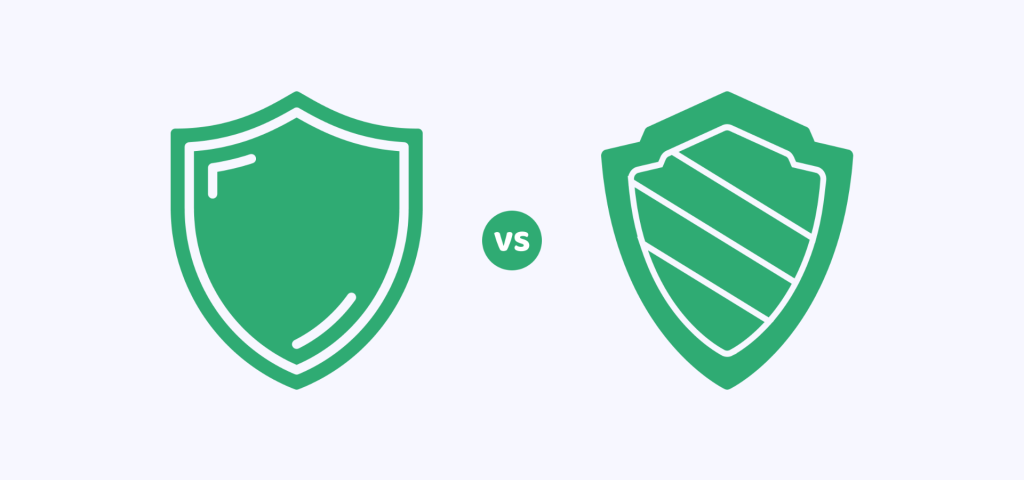
Free VPN vs Paid VPN: Unmasking the Real Deal
When choosing a VPN service, many people are unsure whether to go for a free option or invest in a paid one. Explore the core differences between free and paid VPNs, helping you make an informed decision.
| Feature/Aspect | Free VPN | Paid VPN |
|---|---|---|
| Cost | Free | Monthly/Yearly subscription fee |
| Speed & Performance | Typically slower due to overloaded servers | Often faster with more servers & bandwidth |
| Data Limit | Usually have data limits (e.g., 500MB/month) | Mostly unlimited data or high data limits |
| Security | Might lack advanced security features | Typically offer stronger encryption and advanced security features |
| Privacy | Might log and sell user data for revenue | Usually have strict no-log policies |
| Number of Locations | Limited server locations | Multiple server locations worldwide |
| Ads | Might display ads to cover costs | Typically ad-free |
| Customer Support | Limited or no customer support | 24/7 customer support, often with live chat |
| Features | Basic features | Advanced features like kill switch, multi-hop, split tunneling, etc. |
| Simultaneous Connections | Limited number of devices (sometimes just one) | Multiple devices (e.g., 5 or more) |
| Reliability | Might have frequent disconnections | More reliable with better uptime |
| Updates & Maintenance | Less frequent updates; might lack regular maintenance | Regular updates and maintenance |
Visual Comparison:
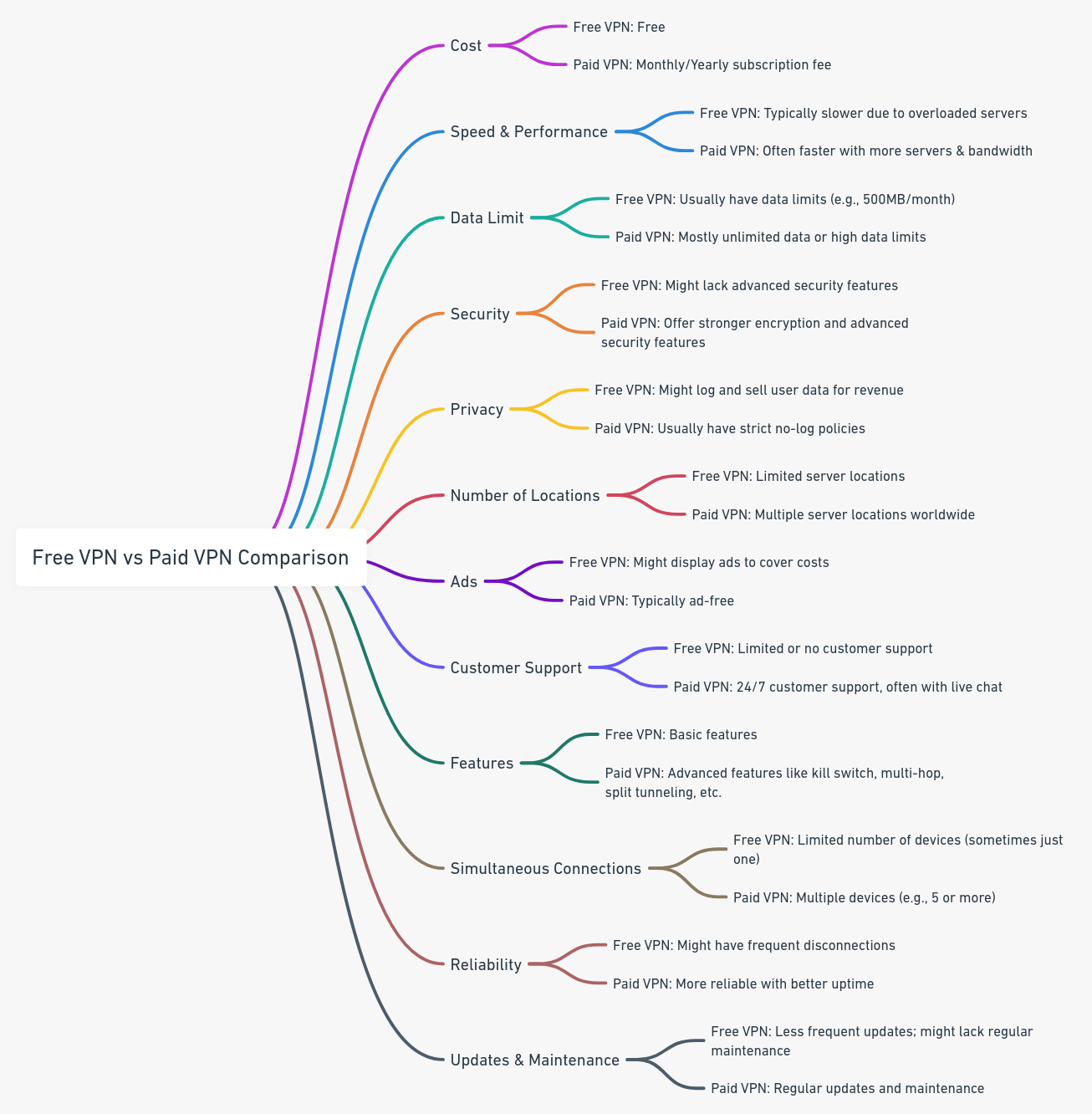
Cost Implications
When considering cost, it's essential to understand the implications of both free and paid VPNs.
Free VPN
One of the most attractive aspects of a free VPN is that it doesn't require any initial investment. You can download the software and start using it right away. However, free VPNs often come with hidden costs.
These hidden costs can include:
- Advertising: Free VPNs often rely on advertising to generate revenue. This means you may be subjected to an influx of ads while using the service, which can be intrusive and affect your user experience.
- Data Collection: Free VPNs may collect and sell your data to third parties to compensate for the lack of upfront payment. This compromises your privacy and defeats the purpose of using a VPN in the first place.
- Restricted Features: Free VPNs may limit certain features or impose data caps, which can be frustrating if you require a VPN for specific purposes, such as streaming or torrenting.
Paid VPN
While paid VPNs require an upfront cost, they often provide better value for money in the long run.
Here are some advantages of using a paid VPN:
- No Ads: With a paid VPN, you can enjoy an ad-free browsing experience without interruptions.
- Enhanced Privacy: Paid VPNs prioritize user privacy and implement strict no-logging policies, ensuring your data remains secure.
- Unlimited Features: Unlike free VPNs, paid VPNs offer unlimited bandwidth, unrestricted access to all features, and the ability to connect multiple devices simultaneously.
- Customer Support: Paid VPNs generally provide dedicated customer support, ensuring you receive timely assistance in case of any issues.
Speed and Performance
Regarding speed and performance, free and paid VPNs offer significantly different experiences.
Free VPN
Free VPNs often have a large number of users and limited servers. This can result in overloaded servers, leading to slower connection speeds. If you're looking to stream content or play online games, the lag caused by a free VPN can be frustrating.
Paid VPN
Paid VPNs invest in dedicated servers, providing users faster and more reliable connections. These servers are optimized to handle high-traffic loads, ensuring smooth streaming, efficient downloads, and minimal latency.
Data Limitations
When it comes to VPNs, data limitations play a crucial role. Let's explore how free and paid VPNs differ in their approach to data restrictions.
Free VPN
Free VPNs often come with monthly data caps or restrictions. This means that once you exceed a specific limit, your connection speed may be throttled or your access to certain websites may be limited. For users who engage in activities that require large amounts of data, such as streaming or torrenting, these limitations can be a significant drawback. However, a free VPN with data limitations may suffice if you only use VPN services occasionally for browsing or light internet usage.
Paid VPN
Unlike their free counterparts, paid VPNs typically offer unlimited or high data limits. This means you can stream your favorite shows, download large files, or indulge in online gaming without worrying about reaching your data cap. Paid VPNs also tend to prioritize speed, ensuring a seamless browsing experience. If you are a heavy internet user or rely on VPNs for resource-intensive activities, a paid VPN might be your better choice.
Security Protocols
Security is paramount when choosing a VPN. Let's compare the security protocols offered by free and paid VPNs.
Free VPN
Free VPNs usually provide basic encryption to protect your data from potential threats. While this encryption is better than no protection, it may not be sufficient against advanced cyber attacks. Additionally, free VPNs may have vulnerabilities that hackers can exploit, compromising your privacy and exposing sensitive information. If security is your top concern, it's worth investing in a more robust solution.
Paid VPN
Paid VPNs prioritize security and offer advanced encryption protocols like OpenVPN, IPSec, or AES-256. These protocols ensure your data remains encrypted and secure, making it extremely difficult for hackers to intercept or decipher. Furthermore, paid VPNs often have additional security features like a built-in kill switch that automatically disconnects your internet if the VPN connection drops. These added layers of security provide peace of mind, especially if you frequently connect to public Wi-Fi networks or handle sensitive data.
Privacy Concerns
Protecting your privacy is the main reason for using a VPN. Let's compare the privacy concerns associated with free and paid VPNs.
Free VPN
One primary concern with free VPNs is their business model. Since they offer free services, they may log user data and sell it to third parties to generate revenue. This means that instead of securing your privacy, these VPNs may compromise it by sharing your browsing habits, personal information, and online activities with advertisers or other companies. If privacy is a priority for you, it is crucial to consider the logging policies of free VPN providers before trusting them with your data.
Paid VPN
In contrast, reputable paid VPNs have strict no-log policies. They do not collect or store information about your online activities, ensuring complete anonymity and privacy. With a paid VPN, you can browse the internet without worrying about your data being tracked, logged, or sold to third parties. If your online privacy is of utmost importance, investing in a paid VPN is a wise decision.
Availability of Servers
One of the crucial factors to consider when choosing a VPN is the availability of servers. The number and diversity of server locations significantly impact the speed and performance of your VPN connection.
Free VPN
Free VPNs often have a limited number of server locations available. Since they do not generate revenue from their users directly, they may have fewer resources to allocate for server infrastructure. As a result, you may experience slower connection speeds due to overcrowded servers. Additionally, free VPNs may not have servers in specific countries or regions you may require, limiting access to geographically restricted content.
Paid VPN
Paid VPNs, on the other hand, offer a global network of servers spread across various locations. These VPN providers invest in a robust server infrastructure to deliver optimal performance. With a wide range of server locations, you can choose the server nearest to your physical location to minimize latency and improve connection speeds. Moreover, paid VPNs usually have servers in numerous countries, allowing you to bypass geo-blocks and access content unavailable in your region.
Advertising and User Experience
Advertisements are a common way for free VPNs to generate revenue. While this allows users to access VPN services without monetary cost, it often comes at the expense of user experience and privacy.
Free VPN
You will likely encounter frequent ads that disrupt your browsing experience when using a free VPN. These advertisements can be intrusive, appearing as pop-ups or banners within the VPN app or while browsing the internet. Apart from being annoying, these ads can also hamper your productivity and compromise your online privacy.
Paid VPN
Paid VPNs provide an ad-free experience, allowing you to browse the internet without interruptions. Since you are paying for the service, there is no need for VPN providers to rely on ads for revenue generation. Not having to deal with incessant advertisements enhances your overall user experience, making paid VPNs popular among individuals who value uninterrupted browsing.
Moreover, paid VPNs offer additional features such as malware protection, ad-blockers, and tracker blockers. These extra features further improve your online security and privacy, providing a comprehensive solution for your internet browsing needs.
Customer Support
Reliable customer support is crucial, especially when dealing with technical issues or concerns regarding your VPN service. While free VPNs may provide some basic support, it is generally limited compared to paid VPNs.
Free VPN
Free VPNs usually offer minimal customer support options. You may find a basic knowledge base or FAQ section on their websites, but live support channels such as chat or phone are often unavailable. This lack of comprehensive customer support can be frustrating when you encounter issues requiring immediate resolution or technical assistance.
Paid VPN
Paid VPNs understand the importance of customer support and invest in providing excellent service. Most reputable paid VPN providers offer 24/7 customer support, including live chat, to assist you with queries or problems. This level of support ensures that you can address concerns promptly and receive timely assistance, enhancing your overall VPN experience.
Furthermore, paid VPNs often have extensive documentation and user guides, helping you navigate the VPN service and troubleshoot common issues independently.
Features Compared
Free VPN
Free VPNs, as the name suggests, offer their services free of charge. They provide the basic functionalities of a VPN, such as encryption and changing your IP address to mask your identity. While they may seem like a good option for casual browsing or accessing geo-restricted content, they often come with limitations. For instance, you may experience slower browsing speeds and have limited server options. Plus, free VPNs often have data caps, meaning you can only use a certain amount of data before you're required to upgrade to a paid plan.
Paid VPN
On the other hand, Paid VPN services offer a wide range of advanced features that enhance your online experience. These include features like a kill switch, which automatically disconnects your internet connection if the VPN connection drops, protecting your data from being exposed. Paid VPNs also often offer split tunneling, allowing you to choose which apps or websites use the VPN connection while others access the internet directly. Additionally, paid VPNs typically have a larger number of servers spread across various locations worldwide, giving you more options for bypassing geo-restrictions and accessing content from different regions.
Reliability and Uptime
Free VPN
One common issue with free VPNs is their potential for frequent disconnections. Since free VPN services have many users, their servers can become overloaded, leading to slower speeds and connection drops. This can be frustrating, especially when streaming or downloading large files. Moreover, some free VPNs make money by displaying ads, which not only slow down your browsing experience but can also compromise your privacy.
Paid VPN
Paid VPNs, on the other hand, prioritize user experience and invest in robust infrastructure. You can expect better uptime and more stable connections with a paid VPN service. This ensures that you can browse, stream, and download without interruptions. Additionally, paid VPNs usually have a dedicated customer support team to assist you with any issues.
Updates and Maintenance
Free VPN
When it comes to updates and maintenance, free VPNs often lag behind. Since they rely on fewer resources than paid VPNs, they may not have regular updates or bug fixes. This can leave your system vulnerable to security risks and exploits. Moreover, some free VPNs have been found to track user activity and sell their data to third parties for profit. So, while you may not pay with money, you could pay with your privacy.
Paid VPN
Paid VPN services take the responsibility of providing regular updates and maintenance seriously. They have dedicated teams that continuously work to enhance security measures and add new features to ensure you stay protected in the ever-evolving digital world. By investing in a paid VPN, you can have peace of mind knowing that your data is encrypted and your privacy is safeguarded.
Recommendations
If you're looking for a free VPN option, here are a few reliable choices:
- Windscribe: Windscribe offers a generous free plan with 10GB of monthly data and access to servers in multiple countries. It provides robust security features and reliable performance.
- ProtonVPN: ProtonVPN offers a free plan with unlimited data, although it has limitations on server access. It is known for its strong commitment to user privacy and transparent privacy policy.
As for paid VPN services, here are a few recommended options:
- ExpressVPN: ExpressVPN is a top-rated VPN service known for its fast speeds and extensive server coverage. It provides advanced security features, reliable performance, and excellent customer support.
- NordVPN: NordVPN offers a vast network of servers worldwide, ensuring access to various locations. It is known for its robust security measures, user-friendly interface, and affordable pricing plans.
Several factors must be considered when choosing between a free VPN and a paid VPN. While free VPNs can be tempting due to cost savings, they often have limitations, such as restricted server locations and intrusive advertisements. On the other hand, paid VPNs provide a more robust and user-friendly experience with a broader range of servers, enhanced features, and reliable customer support.
Choosing between a free VPN and a paid VPN depends on your specific needs and priorities. If you value a seamless and secure browsing experience and require access to a global network of servers, investing in a paid VPN is the way to go. However, a free VPN may suffice if you have minimal requirements and are comfortable with some limitations.
Remember, your online privacy and security should always be a priority, and choosing a VPN that aligns with your needs will ensure that you can browse the internet safely and anonymously.
